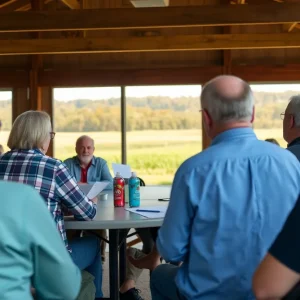Saluda County Faces Rabies Threat After Skunk Exposure
Saluda County, S.C. – A recent report from the South Carolina Department of Public Health has raised alarms after a skunk found in Saluda tested positive for rabies. The discovery has resulted in a quarantine for one dog and two cats who were exposed to the infected animal. Thankfully, there were no reported human exposures.
Details of the Incident
The skunk was located near Denny Hwy and Long Road in Saluda. On August 12, the wildlife was submitted for testing, and the results confirmed rabies the following day. The health department is closely monitoring the situation, and the pet owners have been informed about the necessary quarantines under state law.
Rabies is a serious viral infection that usually spreads through bites or scratches. According to Terri McCollister, the Rabies Program director, the virus can also be transmitted through contact with infected saliva or nerve tissue. This means that even if an animal does not bite, touching it or coming into contact with its bodily fluids can pose a risk.
Other Rabies Cases in the Region
Saluda’s skunk is not the only case. The health department also reported that a bat found near Huntington and Cecillia drives in Charleston tested positive for rabies, exposing four people who have since been referred to healthcare providers. A cat linked to that case is also undergoing quarantine.
Additionally, a raccoon discovered near Saluda Road and Fifth Street in Chester has tested positive. In this case, no humans were exposed, but one dog will be quarantined as required by law. As of now, 49 cases of rabid animals have been confirmed across South Carolina this year.
Understanding Rabies Risks
Raccoons are known to be the most common carriers of rabies in South Carolina and can significantly contribute to the virus’s spread. The Department of Public Health emphasizes the importance of avoiding interactions with wild animals. If you spot a stray or wild animal in distress, it is advisable to maintain a safe distance and call animal control or wildlife professionals for assistance.
If someone is bitten or scratched by an animal that could potentially be rabid, it is crucial to report the incident to the appropriate health department authorities. The contact numbers for health offices across South Carolina have been provided for those needing to report exposures.
Precautionary Measures for Pet Owners
Conclusion and Next Steps
The situation in Saluda County serves as a reminder of the ongoing risk posed by rabies in South Carolina. Pets can become unintentional carriers of the virus, so responsible pet ownership is essential. Residents are encouraged to keep informed, maintain vaccinations for their pets, and observe local wildlife from a safe distance.
For more information about rabies and proper reporting procedures, citizens can visit the South Carolina Department of Public Health’s website or contact their local public health office during business hours.




























